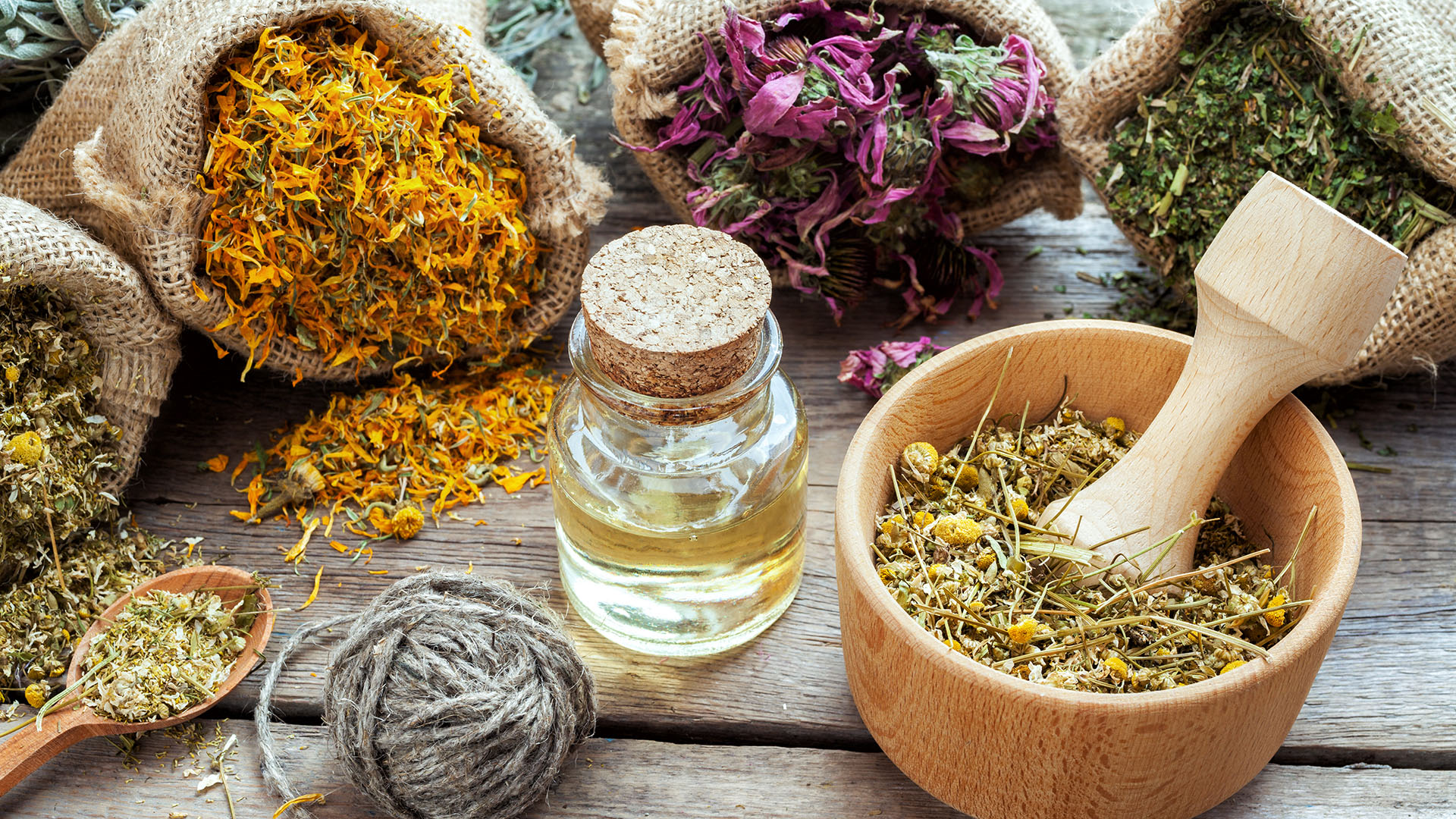Herbal Medicine
Also known as phytotherapy, the use of plants and herbs in healing is an ancient tradition.

Also known as phytotherapy, the use of plants and herbs in healing is an ancient tradition.
Herbal medicine is exclusively made from plants and is the oldest and still the most widely used system of medicine in the world today. Uses of herbal medicine (also known as Phytotherapy) has been found in all societies and is common to all cultures. Phytotherapy applies scientific research and the highest professional standards to the practice of herbal medicine and encourages and adapts to recent worldwide growth in scientific information on plant drugs and their effective and safe use.
In today’s industrial age, harmful toxins and chemicals are produced as a result of our genetically modified, massed produced, economically driven society. These byproducts infiltrate the environment and consequently cause long-lasting ailments and detriment to the world’s population. While the industrial age has provided for a better overall lifestyle, we do have a choice when it comes to the treatments necessary to have a healthier life. Connecting natural resources with medicinal remedies has been a proven alternative to more current approaches. Nearly 80% of Asian and African countries are using herbal medicines for some aspect of primary health care (as estimated by WHO).
Phytotherapy medicines differ from plant-derived medicines in standard pharmacology. Where standard pharmacology isolates an active compound from a given plant, phytotherapy aims to preserve the complexity of substances from a given plant with relatively less processing while maintaining effectiveness and safety. The study of plants for medicinal purposes led to the deriving of certain compounds used within pharmaceuticals.
Documented herbal remedies from plants to treat diseases dates back over 5,000 years. Today, nearly one-third of Americans use herbs to treat many conditions, such as allergies, asthma, eczema, premenstrual syndrome, rheumatoid arthritis, fibromyalgia, migraine, menopausal symptoms, chronic fatigue, irritable bowel syndrome, and cancer, and many more.
Clinical experience has shown that herbal medicine may be used for a number of conditions and issues and that the benefits include:
In phytotherapy, plant medicines are selected mainly to stimulate or strengthen the body’s normal functions, and so help the body heal itself. Plant or botanical medicines contain many ingredients and may have several simultaneous therapeutic biochemical actions in the body. Any herbal medicine prescribed to the patient may be a combination of plants chosen for the therapeutic actions required to treat that individual.
Each herb or plant used in phytotherapy have active ingredients, chemicals or constituents that have an effect on the body. For example, hypericin and hyperforin are considered to be the active ingredients in the herb St. John’s wort, although the benefits of St. John’s wort is not just a result of these two chemicals, but of a synergistic interaction between these two chemicals and a host of other naturally occurring chemicals found in the herb. Pharmaceutical companies often isolate an active chemical ingredient from an herb and produce a synthetic replicate of the chemical to place it into a drug. The end result of this process is a powerful drug with many side-effects, but without the benefits of the synergistic interactions of the herb’s original ingredients.
Phytotherapy provides a functional approach to healing – using cell signaling to affect a patient’s body early on in the disease process. Responses within cells that originate from the plant are known as phytocrines – the bioactive molecules in plants that share features with human hormones and “connect” with the endocrine system. In this respect, certain phytotherapeutic supplements aid in promoting or countering actions similar to the hormones in a patient’s system.
Another principle key to phytotherapeutic action is an adaptogenic effect, in which the patient’s body responds to and uses plant molecules in various ways, depending on how much and in what proportions are needed in regulating and metabolizing them. This is in stark contrast with pharmaceutical intervention, which can leave the body with too much or too little of the hormone or medication on board, which can ultimately result in severe vulnerability and further dysfunction.

“Botany and medicine have been the closest of friends and the most distant of strangers. Two hundred years ago, anyone wishing to be a physician had to study botany, because most medical prescriptions were made from plants. Today it is unheard of for premedical students to major in botany, and interactions between the two fields are minimal. Yet drugs of plant origin still account for a respectable percentage of doctors’ prescriptions, and for a number of reasons, research interest in natural pharmaceuticals is again on the upswing.”
– Dr. Andrew Weil, MD
founder, professor, and director of the Arizona Center for Integrative Medicine at the University of Arizona
Herbs are used worldwide to treat conditions and diseases, and many studies prove their efficacy. In fact, of the 177 drugs approved worldwide for the treatment of cancer, more than 70 percent are based on natural products/herbs/plants.
source: Herbal Medicine, Western Journal of Medicine, 2001
Herbal medicine is considered natural and safe, however, when taking herbal medicines, you may consider possible interactions with other medications. For example, mixing herbs and drugs that have similar actions such as anticoagulant drugs with ginkgo, a natural blood thinner; the herb valerian, a sedative, shouldn’t be mixed with prescription sleeping pills.
At the New York Center of Innovative Medicine, herbal medicine is one of many different treatment options considered for each patient. Our center has a fully stocked dispensary with numerous different herbal supplements and preparations, each specifically tested and brought in from high-quality manufacturers from around the world. However, the use of any herbal supplement is only provided to patients after an in-depth initial evaluation reveals it would be necessary for your personalized program of treatment. Because each person is unique, and their health needs are different, there is no set protocol for using herbal medicines nor is the patient able to request the use of specific herbs and preparations if the medical team finds it would not be as helpful as another treatment or a specific combination of therapies. The ultimate goal is the complete restoration of health in the most efficient and safe manner, and with so many therapeutic options, it is impossible to know if any herbal supplement is right for you without an initial evaluation at our clinic.
Contact NYCIM and Book Your Appointment Today
or
» Take Our Questionnaire to See if You’re a Good Candidate
or
» See Additional NYCIM Services & Therapies
Innovative Medicine is about restoring your body and mind’s power to heal itself. Learn how to tap into your unique healing potential by signing up for our newsletter.

 HeartQuest
HeartQuest
Trackbacks & Pingbacks
[…] Herbal Therapies – age-old practices of utilizing herbs and plants to heal […]
Leave a Reply
Want to join the discussion?Feel free to contribute!